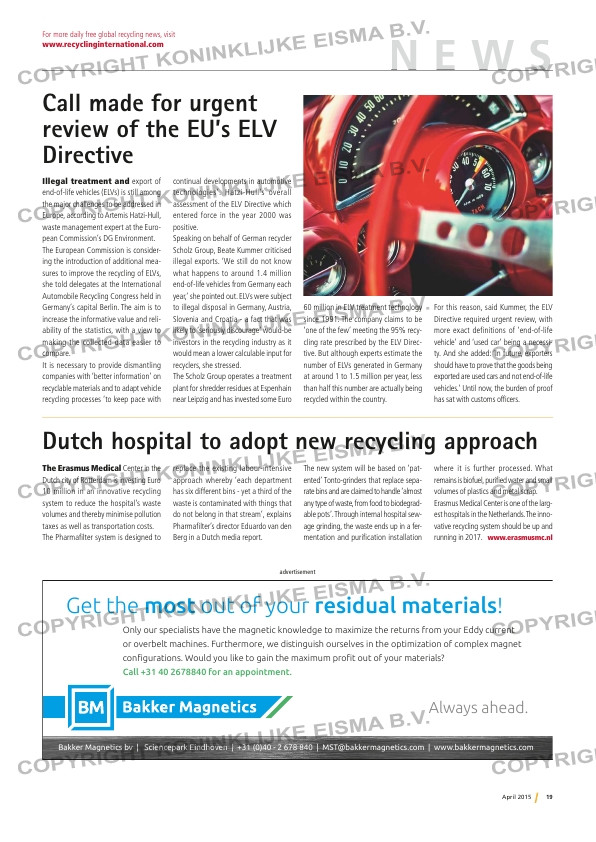Page 19 from: April 2015

N E W S
19April 2015
For more daily free global recycling news, visit
www.recyclinginternational.com
Get the most out of your residual materials!
Always ahead.
Only our specialists have the magnetic knowledge to maximize the returns from your Eddy current
or overbelt machines. Furthermore, we distinguish ourselves in the optimization of complex magnet
configurations. Would you like to gain the maximum profit out of your materials?
Call +31 40 2678840 for an appointment.
Bakker Magnetics bv | Sciencepark Eindhoven | +31 (0)40 – 2 678 840 | [email protected] | www.bakkermagnetics.com
advertisement
Dutch hospital to adopt new recycling approach
The Erasmus Medical Center in the
Dutch city of Rotterdam is investing Euro
10 million in an innovative recycling
system to reduce the hospital’s waste
volumes and thereby minimise pollution
taxes as well as transportation costs.
The Pharmafi lter system is designed to
replace the existing labour-intensive
approach whereby ‘each department
has six different bins – yet a third of the
waste is contaminated with things that
do not belong in that stream’, explains
Pharmafi lter’s director Eduardo van den
Berg in a Dutch media report.
The new system will be based on ‘pat-
ented’ Tonto-grinders that replace sepa-
rate bins and are claimed to handle ‘almost
any type of waste, from food to biodegrad-
able pots’. Through internal hospital sew-
age grinding, the waste ends up in a fer-
mentation and purifi cation installation
where it is further processed. What
remains is biofuel, purifi ed water and small
volumes of plastics and metal scrap.
Erasmus Medical Center is one of the larg-
est hospitals in the Netherlands. The inno-
vative recycling system should be up and
running in 2017. www.erasmusmc.nl
Call made for urgent
review of the EU’s ELV
Directive
Illegal treatment and export of
end-of-life vehicles (ELVs) is still among
the major challenges to be addressed in
Europe, according to Artemis Hatzi-Hull,
waste management expert at the Euro-
pean Commission’s DG Environment.
The European Commission is consider-
ing the introduction of additional mea-
sures to improve the recycling of ELVs,
she told delegates at the International
Automobile Recycling Congress held in
Germany’s capital Berlin. The aim is to
increase the informative value and reli-
ability of the statistics, with a view to
making the collected data easier to
compare.
It is necessary to provide dismantling
companies with ‘better information’ on
recyclable materials and to adapt vehicle
recycling processes ‘to keep pace with
continual developments in automotive
technologies’. Hatzi-Hull’s overall
assessment of the ELV Directive which
entered force in the year 2000 was
positive.
Speaking on behalf of German recycler
Scholz Group, Beate Kummer criticised
illegal exports. ‘We still do not know
what happens to around 1.4 million
end-of-life vehicles from Germany each
year,’ she pointed out. ELVs were subject
to illegal disposal in Germany, Austria,
Slovenia and Croatia – a fact that was
likely to ‘seriously discourage’ would-be
investors in the recycling industry as it
would mean a lower calculable input for
recyclers, she stressed.
The Scholz Group operates a treatment
plant for shredder residues at Espenhain
near Leipzig and has invested some Euro
60 million in ELV treatment technology
since 1991. The company claims to be
‘one of the few’ meeting the 95% recy-
cling rate prescribed by the ELV Direc-
tive. But although experts estimate the
number of ELVs generated in Germany
at around 1 to 1.5 million per year, less
than half this number are actually being
recycled within the country.
For this reason, said Kummer, the ELV
Directive required urgent review, with
more exact definitions of ‘end-of-life
vehicle’ and ‘used car’ being a necessi-
ty. And she added: ‘In future, exporters
should have to prove that the goods being
exported are used cars and not end-of-life
vehicles.’ Until now, the burden of proof
has sat with customs offi cers.
RI-3 NEWS.indd 19 30-03-15 10:07



